How to Switch to a Plant-Based Diet
A guide for Georgians interested in a climate-friendly diet
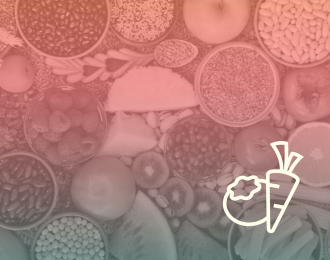
What Does a Plant-Based or Plant-Forward Diet Mean?
Read more about the wide variety of nutritious foods that can be a part of any plant-based diet.
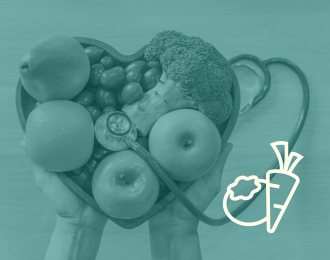
Is Switching to a Plant-Based Diet Good for Your Health?
Learn about the health benefits you may experience from a plant-based diet, depending on the foods you choose to eat.
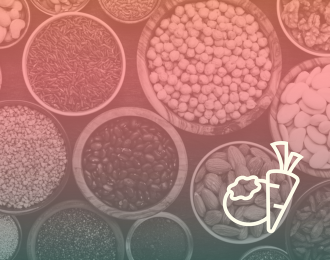
How Do You Get Enough Protein on a Plant-Based Diet?
There are so many delicious plant-derived sources of protein. Find out how to get all the protein your body needs.

What Are the Potential Negatives of a Plant-Based Diet?
Can a plant-based diet be too restrictive or expensive to follow? Consider the various factors involved in going plant-based.

Is a Plant-Based Diet Better for the Environment?
Find out how switching to a mainly plant-based diet can help reduce emissions and protect the environment.
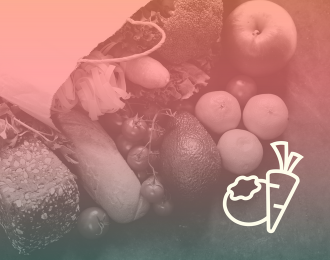
How Do You Start a Plant-Based Diet as a Beginner?
Changing your diet may seem daunting, but these tips can help you ease into a new routine in a way that works for you.

What Should Be on a Plant-Based Grocery List?
Get inspired by a diverse list of foods to shop for each week to keep you and your family happy and healthy.
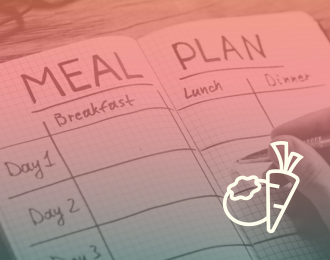
What is a Good Plant-Based Meal Plan to Follow?
Finding a meal plan that works for you is key. Here’s what a day on a plant-based diet might look (and taste) like.

What Are Good Resources for Plant-Based Recipes?
There are a wealth of websites and cookbooks dedicated to plant-focused recipes - here are a few recommendations.

Glossary of Terms: A Guide to Plant-Based Diets
Vegan, vegetarian, climatarian, pescatarian - learn what these terms mean, and what the differences are between these diets.

Resources: Learn More About Plant-Based Diets
Interested in learning more? There are many great resources about plant-based eating that you can explore.

Watch a Webinar About Adopting a Plant-Based Diet
Watch Dr. Keisha Callins, the author of this toolkit, give an informative presentation about plant-based diets.
What Is a Plant-Based or Plant-Forward Diet?
A plant-based or plant-forward diet is a way of eating that focuses on getting more of your nutrition from plants. People who adopt this style of eating are not necessarily vegetarians or vegans. Instead, people who adopt plant-based or plant-forward diets just incorporate more plant-based nutrition into their eating patterns.
Why should you consider choosing a plant-based diet? There are so many reasons--and this toolkit will explore many of them--but above all, when you adopt a plant-based diet, you not only have the opportunity to improve your own personal health, but you have the opportunity to improve the planet’s health, too.
What Foods Do You Eat on a Plant-Based Diet?
Easy-Peasy… In addition to fruits and vegetables, you can eat a variety of nuts, seeds, oils, whole grains, legumes, and beans. In short, you can eat almost everything, including small amounts of dairy, seafood, poultry, and even red meat, if you like!
Adopting a plant-based diet means that most of your calories come from plant-derived sources, but it doesn’t have to mean that you are vegetarian or vegan. It’s important to ensure that your diet is as sustainable for you as it is for the planet. Over time, you can train your palate to prefer fruits, vegetables, beans, and grains, and it’s okay to occasionally reach for meat or dairy, especially if it comes from a local, pasture-based farm. Overall, try to “eat the rainbow” when it comes to fruits and vegetables and emphasize plant-derived foods.
You can approach your plant-based diet as an adventure that presents a multitude of options to try something new, like a tofu scramble instead of eggs, or an old favorite reimagined, like Buffalo-style cauliflower “wings”!
Can You Occasionally Eat Meat on a Plant-Based Diet?
Yes, absolutely! A plant-based diet is a pattern of eating where you prioritize plant-based options, but it does not mean you could never eat meat or dairy.
As one example, the EAT-Lancet Planetary Health Diet recommends the following guidelines for the consumption of animal products as you transition to a more plant-based diet: no more than one serving of dairy per day and no more than one small portion of red meat, two servings of poultry, and two servings of fish per week.
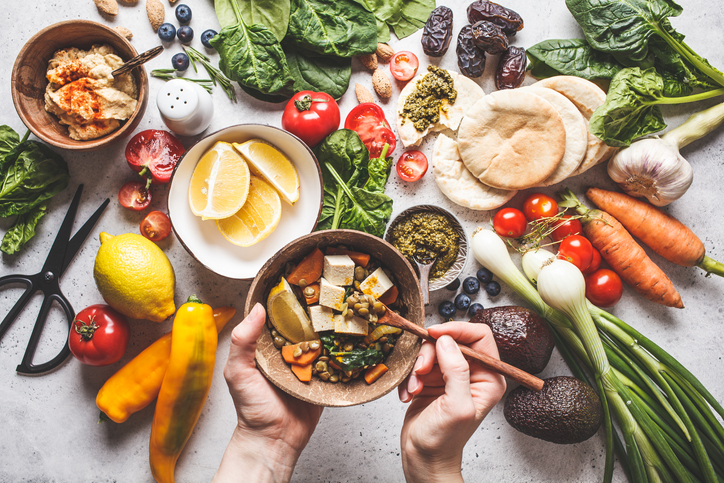
Is Switching to a Plant-Based Diet Healthy?
Yes! Like any diet, it depends on the foods you choose to eat. If you’re mainly eating french fries and other carbohydrates, you are technically eating plant-based foods, but would be missing many vital nutrients.
A well-balanced plant-based diet is not deficient in the essentials for optimal health (protein, fats, carbohydrates, vitamins, and minerals) and may offer the added benefit of fiber (helps to keep your bowels regular) and phytonutrients (help fight cancer cells).
Is It Safe to Eat a Plant-Based Diet During Pregnancy?
Yes! A plant-based diet is a healthy choice at any stage of life and can provide the additional nutrition needed to support pregnancy and breastfeeding. For example, a plant-based diet can easily provide adequate amounts of Calcium (found in foods like spinach and beet greens), Folate (oranges, bananas), Iodine (iodized salt and seaweed), and Vitamin A (sweet potatoes, and carrots).
Prenatal vitamins are still generally recommended for most people regardless of their dietary habits and should contain key nutrients such as B-12, DHA, and Choline.
While breastfeeding, there may be an increased need for overall calories, protein, and vitamins D and B12.
Can I Eat a Plant-Based Diet if I Have a Compromised Immune System or Other Health Conditions?
It’s a win-win situation! Research has shown that a plant-based diet is a great way to optimize your health. To put it in sports terms, a plant-based diet is a lifestyle strategy that can help your body play a better defense and a bolder offense by boosting your immune system, reducing inflammation, and helping you maintain a healthy weight.
A plant-forward diet has the potential to improve your overall well-being by removing or reducing physical barriers to achieving your goals for all the things you need and want to do.
Do I need any special supplements if I’m not eating meat?
Any unbalanced diet- whether you are eating meat or not - can lack nutrients! Because a plant-based lifestyle encourages the intake of a wide variety of foods, it actually may have the potential to be the most balanced diet you can follow.
If your plate is covered mostly in some combination of vegetables, beans, peas, nuts, seeds, whole grains, and tofu, as well as occasional dairy, eggs, poultry, and fish, you are unlikely to leave any gaps in your nutritional needs.
However, If you decide to become a vegetarian or vegan, you should discuss the benefits of taking supplements (such as B12, Zinc, and D3) with your health provider or a nutritionist/dietician.
How can a plant-based diet benefit me and my family?
It could help you extend your life and improve your quality of life! A plant-based diet has been shown to reduce your risk of chronic diseases such as heart disease, diabetes, and high blood pressure. It has also been shown to decrease your risk of developing or dying from the leading causes of death – cancer, heart disease, and stroke. It is just as important to realize that if you should become ill, a plant-based diet helps to strengthen your immune system and help reduce your recovery.

How Do You Get Protein on a Plant-Based Diet?
It’s a common misconception that plant-based diets don’t provide enough protein, but that just isn’t true!
What are Plant-Based Sources of Protein?
Let’s keep it plain and simple! Plant-based protein comes from plants. Easy to find options include beans, broccoli, chickpeas, greens, lentils, nut butters, seeds, peas, potatoes, quinoa, seaweed, soymilk, spinach, tempeh, and tofu.
What Vegetables Are High in Protein?
You are probably already familiar with 5 of the plants that are highest in protein, including:
- spinach (remember Popeye)
- kale (not just a good garnish!)
- lentils (super easy to cook)
- broccoli (not just for your kids)
- beans (so versatile… they can be added to breakfast/lunch/dinner/and supper too!)
Can You Build Muscle with Plant Protein?
Surprise, Surprise… the answer is yes! All plants have protein, and your body is naturally designed to use any protein to build muscle. Research shows that plant protein is not inferior to animal protein. In fact, according to a study reported in Sports Medicine, in response to resistance training, a high-protein, plant-based diet supports muscle strength and mass gains just as well as a high-protein diet from animal sources.
Which Is Better, Plant Protein or Animal Protein?
Hands down, more bang for your buck from plant protein! In addition to the fact that switching from animal-based protein can help reduce greenhouse gas emissions, it can also help you stay healthier. Plant-based proteins are nutritional overachievers because they provide many added benefits including vitamins and minerals (keep you healthy overall), antioxidants (help prevent cancer), phytochemicals (strengthen the immune system), and fiber (keeps your bowels regular). In addition, plant proteins may offer a protective benefit to your kidneys in the long run.
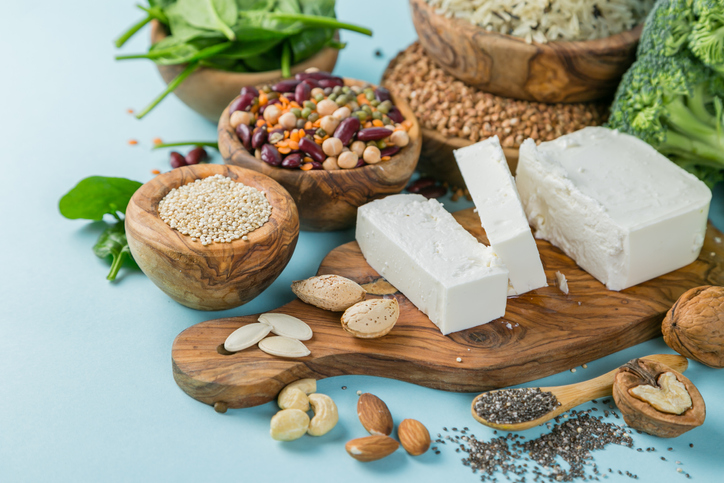
What Are the Negatives of a Plant-Based Diet?
Grow into a new attitude! The hardest part about switching to a plant-forward pattern of eating is that it requires us to abandon the attitude that historically, eating meat has been thought to be a source of strength (hunters/soldiers) and later became associated with prestige on a platter.
Time has shown that it is more prudent to seek plant-based protein for better long-term health. We can now embrace that our status in society should not be based on what we eat (or wear for that matter).
Is a Plant-Based Diet More Expensive?
Quite the contrary! You may actually save a few dollars by adopting a plant-based lifestyle, and it may not be as challenging as you think. Try the alphabet approach:
- Avoid faux (fake meat products are often more processed and more costly)
- Buy in bulk (load up on your pulses - beans, lentils, and chickpeas - as they can be cheaper dried and uncooked)
- Choose frozen (if fresh is not available, it’s the next best thing)
- Don’t deviate (stick to your grocery list)
- Explore recipes (try different recipes that allow you to use up the ingredients you already have on hand and that may allow you to swap in ingredients when they are in season).
Do All Neighborhoods Have Access to Plant-Based Foods?
To be honest, this can be tricky but totally doable! Not all neighborhoods and communities in Georgia have the same access to fresh fruits and vegetables. Depending on where you live, it may be helpful to shop outside your zip code.
The good news is that there are many local farmers markets and community cooperative initiatives increasing access to produce. For example, there are farmers markets hosted in select MARTA stations in Atlanta, allowing people to access fresh food as part of their daily commute.
And, many farmers markets across the state have programs to make the food they sell more affordable. For example, many Georgia farmer’s markets accept SNAP/EBT dollars. In addition, some markets allow SNAP/EBT dollars to go further by providing dollar for dollar matching. So, $10 of SNAP benefits, for example, can get you $20 worth of food at these markets.
Finally, the wide variety of plant-based options allows you so much flexibility in what you can put on your plate, and most items like beans, nuts, seeds and whole grain are often easy to find and reasonably priced.
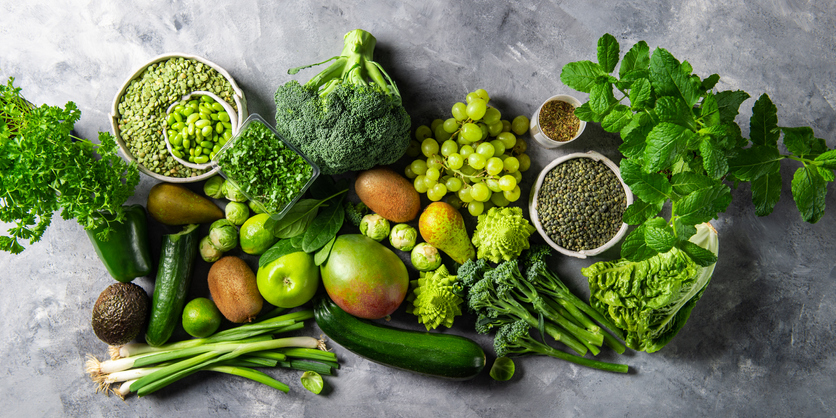
Is Plant-Based Better for the Environment?
That’s an easy one: YES! There is no doubt that your personal food choices can impact the climate. Recent studies show that even just removing beef from the typical American diet, can lower the carbon footprint of our food by almost 25%.
Everyone can help advance climate solutions by adopting a plant-based diet to help preserve our ecosystem and environment.
You can reduce the carbon footprint of your diet even further by eating fruits and veggies in season, buying local produce when possible, avoiding packaged or processed foods, choosing certified organic when possible, and trying to prioritize/plan/prepare for more plant-based sources of protein.
Can Switching to a Plant-Based Diet Cut Greenhouse Gas Emissions?
Yes, and by a significant amount!
Conventional animal agriculture produces greenhouse gas emissions that fuel climate change. For example, cows and other ruminant animals such as goats and sheep release methane gas, a powerful greenhouse gas. This occurs as part of their digestion process as well as from their manure.
Another powerful greenhouse gas, nitrous oxide, is released from manure and is also often used as a chemical fertilizer. Globally, there are also emissions associated with clear-cutting forests to make space for pasture land. A small number of farmers, including some based in Georgia, are raising cattle and other livestock in ways that minimize or even eliminate these impacts. However, most meat we consume in the U.S. does not.
Researchers have worked to quantify the global impact of animal agriculture. Phasing out conventional animal agriculture over the next 15 years would have the same effect as a 68 percent reduction of carbon dioxide emissions by the year 2100. Research and projections by two researchers in the journal, PloS Climate, found the impact of switching to a plant-based diet had the potential to offset almost 70 percent of the heating effect from emissions and limit global warming by 2 degrees.
How Can I Eat Sustainably Without Being Vegan?
Where there is a will, there is a way!
Should you decide to incorporate any animal products into your diet, then it would be best to reach for the pasture-raised options. Here’s why: while grass-fed animals take longer to grow, pasture animals have more room to graze so they can actually improve land use, nutrient and manure management, and soil health while decreasing overall emissions.
In fact, a recent peer-reviewed study demonstrates that while regenerative farming (rotating cattle, chicken, and pigs) requires more than twice as much land, it has the potential to reduce emissions by 66%. That’s a huge climate credit that we can capture just by updating farming practices.
Some farms have even found that carefully managed regenerative grazing practices can actually sequester more carbon into the soil than is produced by raising the livestock.

How Do You Start a Plant-Based Diet?
Just do it, slowly and with intention! Maximize your veggies and don’t be color-blind. Try to make sure half your plate is filled with veggies and make an effort to eat fruits and vegetables in a variety of colors throughout the week.
Minimize animal protein and feel free to start slowly. You might begin by having meat as a topping or garnish instead of the main event; then move to one meat-free day per week. Eventually, meat could become just a celebration food (for example, on your birthday and other special occasions.)
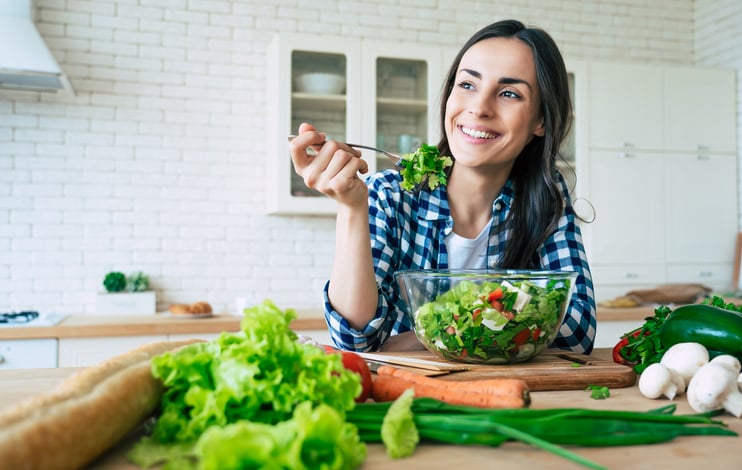
What Foods Should Be on a Plant-Based Grocery List?
Increase:
- Fruits and Vegetables
- Legumes (black beans, chickpeas, kidney beans, lentils)
- Nuts (almonds, cashews, pecans) and
- Seeds (sesame, pumpkin, flaxseed)
- Whole grains (Quinoa, brown rice, oats, teff)
Decrease:
- White Meat (pork, chicken, turkey, and other birds)
- Eggs
- Dairy Products
- Fish and seafood
Limit or Let Go:
- Restaurant Food (read the description if packed with excessive calories)
- Red Meat (e.g., beef, lamb, mutton, veal, venison, goat)
- Processed Meat (e.g., hot dogs, sausages, burgers, salami, jerky, deli meats)
- Ultra-processed foods (e.g., ready to eat meals, sodas, cookies, noodles)
- Sugar (read your label and look for added sugars)
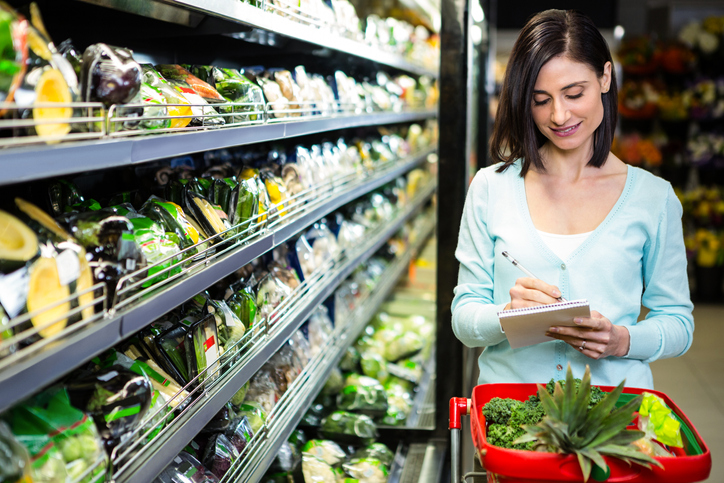
What is a Good Plant-Based Meal Plan?
You must do what works best for you! It is important for you to find a food pattern that works for you. Don’t be afraid to explore and alternate and intertwine your plant-based food preferences- keeping in mind that the goal is to increase plant-based nutrition.
Here are a few examples of what a day of plant-based eating might look like:
Day 1:
Breakfast: Steel-cut oatmeal with chopped nuts, fresh or dried fruit, and a plant-based milk like soy, almond, or oat.
Lunch: Green salad topped with quinoa, chickpeas, cherry tomatoes, fresh or frozen sweet corn, and sunflower seeds or sliced almonds, drizzled with a lemon and olive oil vinaigrette
Dinner: Black bean burgers with coleslaw and sauteed peppers on the side
Day 2:
Breakfast: Tofu (or egg) scramble with mushrooms, greens, and tomatoes; whole grain toast
Lunch: Roasted red pepper + portobello mushroom sandwich with hummus (and cheese, if you please); carrot sticks and a handful of pistachios on the side
Dinner: Minestrone soup with salad and warm rolls with olive oil for dipping
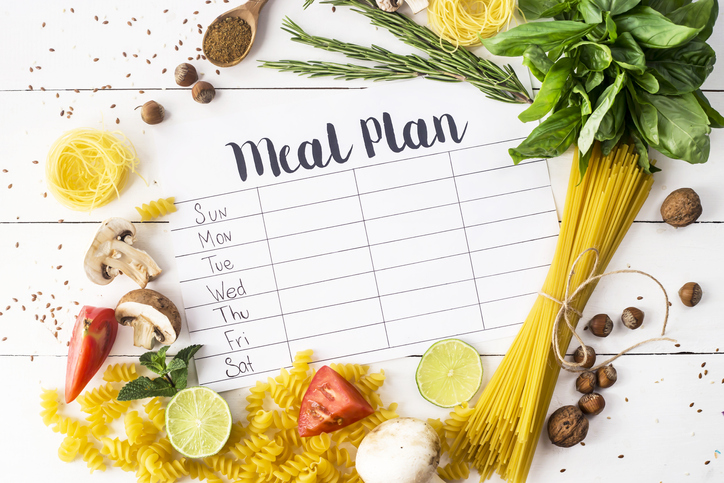
What Are Good Resources for Plant-Based Recipes?
Take your tastebuds on a global adventure! Try recipes that encourage you to explore plant-based recipes from across continents and cultures.
A few resources for plant-based recipes include:
- Deborah Madison’s Vegetarian Cooking for Everyone
- Bryant Terry’s cookbooks, including Afro Vegan and Vegetable Kingdom
- Serious Eats offers a wealth of vegan and vegetarian recipes you can browse by diet
- Plant Based on a Budget focuses on affordable recipes for vegan dishes of all kinds
Make your meals an opportunity to engage family and friends, not just for the food and fellowship but because together, we truly slow down the effects of climate change.
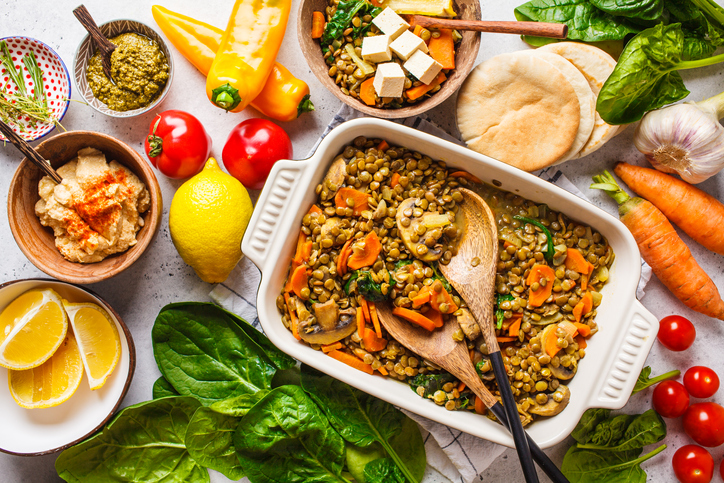
Glossary of Terms: Plant-Based Diets
Climatarian: This diet is based on fruits, vegetables, legumes, nuts, seeds, and whole grains. Red meats like beef and lamb are discouraged, although most climatarians consume moderate amounts of pork, poultry, eggs, dairy products, fish, and seafood.
Flexitarian: A less restrictive way of being vegetarian, the flexitarian diet can include eggs, dairy foods, and occasional meat, poultry, fish, and seafood.
Pescatarian: In addition to plant-derived foods, a pescatarian diet includes eggs, dairy foods, fish, and seafood, but no meat or poultry.
Plant-Based Diet: A diet that is primarily based on plant-derived foods, including grains, beans, and nuts in addition to fruits and vegetables, and may include occasional meat, poultry, dairy, and seafood if desired.
Raw Food Diet: This diet includes eating mainly uncooked, unprocessed foods derived from plants. The raw food diet also emphasizes organic ingredients. Foods may be sprouted, juiced, dehydrated, or blended, but heating foods above 118 degrees Fahrenheit and any other processing is discouraged.
Vegan: A 100% plant-based diet that incorporates no foods derived from animals, often including honey.
Vegetarian: Also known as lacto-ovo vegetarian, this refers to a plant-focused diet that includes eggs and dairy, but no meat, poultry, or seafood.
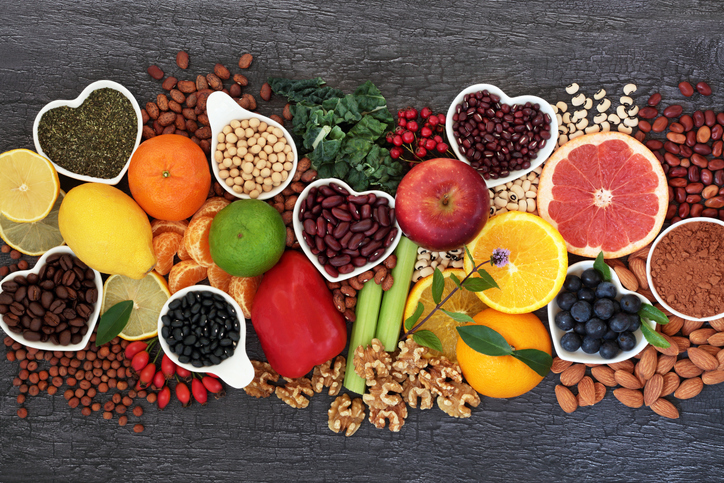
Other Resources
Introduction to Plant-Based Diets + Other Approaches to Sustainable Eating
- What is a plant-based diet and why should you try it?
- The Climatarian Diet
- What is a Climatarian Diet? A Complete Guide to Adopting a Sustainable Eating Approach
- How to eat sustainably without going vegetarian (or vegan)
- A 10-Minute Interactive Guide to a Healthy Plate and a Healthy Planet
- Podcast: Sustainable Diets for Personal and Planetary Health
- Grassfed Beef and Climate Change
- A New Study on Regenerative Grazing Complicates Climate Optimism
Health + Nutrition
- The Power of Plant-Based Eating
- Can a plant-based diet prevent or even reverse chronic disease?
- Do Vegetarians and Vegans Need Nutritional Supplements?
- 5 benefits of plant-based diet
Plant-Based Diets, Pregnancy + Childhood Nutrition
- Pregnancy – A vegan diet while pregnant
- 5 Steps to a Plant-Based Pregnancy Diet
- Are Plant-Based Diets Healthy for Children?
Plant-Based Diets + Protein
- What is plant-based protein?
- Yes, plants have proteins
- Plant Proteins and Kidney Health
- A Nutritionist’s Guide to Plant-Based Protein
- Vegetables High in Protein
- Plant-Based Sources of Protein Infographic
Eating Plant-Based on a Budget
Watch a Video About Plant-Based Diets
In this engaging and informative webinar session, toolkit author Dr. Keisha Callins gives an overview of the content in this toolkit and answers common questions like:
- How does a plant-based diet reduce carbon emissions?
- How can my family make the switch to eating less meat?
- Does going plant-based mean I have to be vegetarian or vegan?
You can also watch the full recording of this webinar, including presentations about composting and electric vehicles.
You may also download Dr. Callins' slide deck, which includes links to useful resources.
Meet Our Expert
This toolkit was written by one of the experts at Community Health Care Systems.
Keisha R. Callins, MD, MPH
Ob/Gyn
Community Health Care Systems


